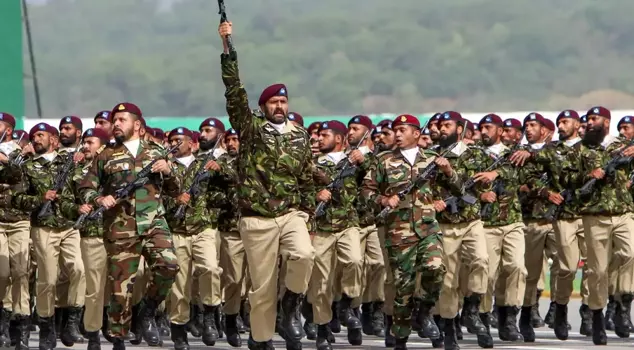
18.09.2025 14:21
The idea of an "Islamic NATO" has resurfaced in light of Israel's attacks and the increasing security risks in the region. At the center of this process are Turkey, Iran, Egypt, and Saudi Arabia. The military capacity and strategic position of these four countries could form the core of the alliance.
After the attack carried out by Israel on the compound where Hamas negotiators are located in Doha, the Organization of Islamic Cooperation (OIC), which convened in Qatar for an extraordinary meeting, discussed a critical agenda that could change the balance in the Middle East. At the summit, the establishment of a NATO-style joint defense pact led by Iran and Egypt was put on the table for discussion.
"IT COULD TURN INTO MILITARY COOPERATION"
According to an analysis published in the US-based Newsweek magazine, the summit in Qatar emerged as the most serious initiative to date for the idea of a "joint Islamic army," which has been voiced among Muslim countries for years but has not been realized. Although Iran and Egypt avoided official statements, it was emphasized that this time the determination was stronger behind the scenes.
ISRAEL'S ATTACKS BROUGHT THE ISSUE TO THE AGENDA
Recent developments in the past months have pushed Muslim leaders to take firmer steps. Israel's 12-day attacks on Iranian targets at the beginning of the year, bombings in Gaza, and most recently the assassination attempt on the Hamas delegation in Doha have brought Israel back to the forefront as the main element destabilizing the region. At the summit, a warning was issued that if action is not taken, Middle Eastern countries would become open targets for new Israeli attacks.
DIFFERENT PROPOSALS FROM EGYPT AND IRAN
As the country with the largest army in the Arab world, Egypt brought the proposal for a Cairo-based joint military command to the table. Iran, on the other hand, signaled strongly for a regional defense pact by calling for a more comprehensive "Islamic NATO."
CALL FOR "A JOINT ARMY TO BE ESTABLISHED"
Mohsen Rezaei, the former commander of the Iranian Revolutionary Guards, stated, "Saudi Arabia, Turkey, and Iraq could be the next targets. The only solution is to establish a military coalition." Senior cleric Jalal Razavi-Mehr emphasized the necessity of establishing a "single Islamic army with a common doctrine." Mehdi Shoushtari from the Iranian Foreign Ministry noted that while it is still early, the current conditions are "much more favorable" compared to the past.
WHICH COUNTRIES WOULD BE INCLUDED IN THIS UNION?
Possible core countries
- Turkey → As a NATO member and due to its regional military capacity, it would be a natural actor in such a structure.
- Iran → One of the countries leading this idea. The call for an "Islamic NATO" is particularly voiced by Iranian officials.
- Egypt → It has the largest army in the Arab world and stands out with the proposal for a "Cairo-based joint command" at the summit.
- Saudi Arabia → It holds a critical position due to its Gulf leadership and financial resources.
Countries expected to participate from the Gulf and the Middle East
- Qatar → The host of the summit and has close ties with Hamas.
- Iraq → It is on the agenda as it could be the "next target," according to Rezaei.
- Jordan → Its neighboring position to Israel and security concerns may lead to its inclusion in the process.
- Pakistan → Its status as a nuclear power gives it high symbolic and strategic importance.
Countries that could be considered in a broader context
- Indonesia and Malaysia → Strong representatives of the Islamic world in Asia.
- Algeria and Morocco → They stand out in North Africa with both military capacity and their activities within the OIC.
- Azerbaijan → Its strategic partnership with Turkey may frequently bring its name into discussions.
Countries with uncertain participation
- UAE and Bahrain → They may remain hesitant due to normalization steps with Israel (Abraham Accords).
- Kuwait → Although it stands out with its strong anti-Israel stance, it may be cautious regarding military engagement.
- Some Muslim countries in Africa (Niger, Sudan, Somalia, etc.) → While they may provide political support to the alliance, their active military role may remain limited.
In summary, the core structure could be formed by countries such as Turkey, Iran, Egypt, Saudi Arabia, Qatar, and Pakistan, and it could expand with support from countries in Asia and Africa. However, the most critical question will be how a consensus will be reached in the Saudi Arabia-Iran-Turkey triangle.
35-YEAR DREAM
- This idea has been discussed at different times within the Organization of Islamic Cooperation (OIC), which was established in 1969. However, its concrete expression dates back to the mid-1990s.
- In 1994, then-Pakistani Prime Minister Benazir Bhutto explicitly stated that Islamic countries should establish a common defense force.